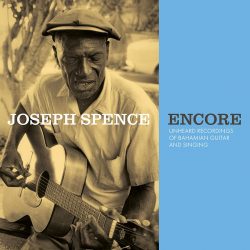Unexpectedly joyous and mesmerising music by a master from a bygone era.
 The esteemed editor here at AUK likes to keep the writers on their toes by supplying a diverse range of material for review; however, even by his high standards he has unearthed a real peach with the new release, ‘Encore: Unheard Recordings of Bahamian Guitar and Singing’ – a new album of previously unheard archival material from Bahamian guitarist Joseph Spence. Spence’s radically innovative guitar style transformed elements of Bahamian traditional music into adventurous, joyful improvisations and influenced artists and bands such as Richard Thompson, Ry Cooder, Taj Mahal and The Grateful Dead. The word “unique” is often overused, but by any measure, the music of Joseph Spence unarguably qualifies for the application of that adjective.
The esteemed editor here at AUK likes to keep the writers on their toes by supplying a diverse range of material for review; however, even by his high standards he has unearthed a real peach with the new release, ‘Encore: Unheard Recordings of Bahamian Guitar and Singing’ – a new album of previously unheard archival material from Bahamian guitarist Joseph Spence. Spence’s radically innovative guitar style transformed elements of Bahamian traditional music into adventurous, joyful improvisations and influenced artists and bands such as Richard Thompson, Ry Cooder, Taj Mahal and The Grateful Dead. The word “unique” is often overused, but by any measure, the music of Joseph Spence unarguably qualifies for the application of that adjective.
Spence, as he was known to friends and family, was born in the settlement of Small Hope on Andros, the largest island in the Bahamas and one of the least accessible, due to its inhospitable coastlines and swampy interior. As such, Andros was a place where Bahamian music traditions thrived, substantially undisturbed by tourism or commercialism, well past the middle of the 20th century. On the west coast of Andros, the island’s isolation was enforced by a 20,000-square-mile expanse of shallow waters known locally as “the mud”.
The shallowness that prevented ships from approaching the shore also made the area a prime location for sponge fishing (known as sponging), a major industry in the Bahamas from the late 1800s to the 1930s. The work was carried out by the crews of small sponging boats. Shallow water was essential because the sponges had to be individually harvested from the sea’s coral floor by a crewman known as a hooker in a dinghy above. Living on their boats for weeks or months at a time, the spongers endured the long, dark nights by singing together, forging a new tradition called rhyming, which began, flourished, and ended in the 20th century. A rhyming group included a lead singer (the “rhymer”), who improvised fast-paced, syncopated verses against a background typically provided by bass and treble (tenor) singers. The rhymer’s subjects included stories from the Bible or accounts of local storms or drownings and indeed, ‘Run Come See Jerusalem‘ tells one such story where, in 1929, Spence himself helped pull bodies from the water after the schooner Pretoria sunk with the loss of 35 lives.
Using the written word to try and describe the sound is near impossible and what is written here will come nowhere close to doing it justice. Being Caribbean, the music has some roots in Calypso, but it feels highly improvisational, encompassing as it does elements of the blues, gospel, traditional folk and, at times, even has a jazz-like feel to it and indeed, Spence has been called the folk guitarist’s Thelonius Monk and as soon as you listen you can see why. He plays the guitar (often tuned in a Drop D tuning to give another two semitones of range) with a percussive, staccato-like attack with dramatic, almost dissonant chord changes all interspersed with unexpected hesitations and silences.
From start to finish ‘Encore‘ keeps you on your toes, and you never know what’s coming next. On top of the unorthodox guitar style is the singing, except it’s not really singing by normal standards, stemming directly as it does from that “sponging” rhyming tradition. Spence has a unique (there’s that word again), uplifting delivery with short bursts of often guttural lyrics interspersed with humming and other sorts of extraordinary vocalisation. On first listen, you may (metaphorically anyway) scratch your head in some puzzlement, but before you know it, you’ll be tapping your toes to the wonderful rhythms while a stupid grin inexorably spreads across your face!
The album was recorded by renowned recording engineer, documentarian, and producer Peter Siegel in 1965 in concert in New York City, at Spence’s cottage in the Bahamas and at Siegel’s parents’ apartment in Manhattan, and it provides rare insight into a grandmaster at his musical peak. Given the age of the recording, the quality is simply outstanding and if your mind is open to exploring the unique (!) music of Joseph Spence then there is no better place to start than ‘Encore: Unheard Recordings of Bahamian Guitar and Singing’. This is an album that will undoubtedly take you out of your comfort zone but the masterful playing and the rhythmic singing will effortlessly transport you to another place and another time. It’s truly enthralling, and real credit is due to Smithsonian Folkways Recordings (the non-profit record label of the Smithsonian Institution) for ensuring that music such as this is kept for posterity.


